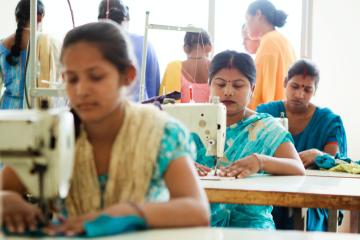
Countries, companies, and institutions around the globe are embracing circular approaches to accelerate the shift to sustainable consumption and production patterns. This event at Stockholm+50 on 3rd June organized by GO4SDGs and UNEP FI brought together financial institutions, development banks, UN Agencies, and other partners to share insights, initiatives, and best practices on financing circularity and its potential for a sustainable recovery and green jobs generation. Discussions were around ways to promote circular economic models, including retaining the value of materials and products, and keeping them in the economy; phasing out waste and pollution; and regenerating natural systems.
Some of the key messages and recommendations from the event are:
• Move away from the current ‘take, make, and dispose’ extractive industrial model, towards a circular pathway that will contribute towards achieving the SDGs.
• Restructuring our economies away from linear and extractive models and towards regenerative and circular ones.
• Financing new business models that support a more regenerative approach of effective and nature-based solutions.
• Countries need to embed circular economy strategy to their nationally determined contributions (NDCs)
• Need for guiding principles, policy coherence, inclusive dialogues, and intergenerational and gender equality for a just transition, including human-cantered elements in financing efforts for the circular economy.
More information about this event: Summary and Recording.
Series of Webinars on Finance and Circular Economy:
UNEP FI, UNEP, the Inter-American Development Bank (IDB), IDB invest, the eco.business Development Facility and its Sustainability Academy, GO4SDGs, Circular Economy Coalition are organizing a series of webinars exploring how financial institutions can accelerate the transition to a circular economy. The series is designed for financial actors, including executives from financial institutions, institutional investors, impact investors, insurance companies, representatives from government agencies such as financial market regulators and supervisors.
The program consists of five webinars of one hour each in Spanish with simultaneous translation into English and Portuguese. These will have both a theoretical and practical approach in the development of cases, methodological development in the application of circular economy criteria for the successful evaluation of credit risk and identification of circular projects in the commercial area. It will also explore measurement metrics at sectoral level to strengthen decision making and encourage institutions to develop financial services to accompany different industries in the transition to a circular economy with more sustainable consumption and production patterns.
• 9 June: Financing the Circular Economy | Watch the recording
• 3 August: The Circular Economy as the key element in the race to Net Zero | Registration Form
• 24 August: Financing the Circular Economy applied to Small and Medium Enterprises (SMEs)
• 21 September: Setting targets linked to the Circular Economy
• 17 October: Determining taxonomies and metrics applicable to the Circular Economy
